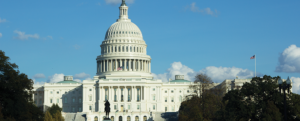
The Republican tax plan unveiled in the House of Representatives on Thursday would make higher education less affordable.
Two education-related tax benefits would be eliminated by a tax bill unveiled by House Republicans yesterday, changes that could make higher education less affordable if the bill passes in its current form.
The bill, which would lower the corporate tax rate from 35 percent to 20 percent, consolidate seven income tax brackets into three and repeal the estate tax by 2024, would reduce federal revenue by $1.51 trillion over the next 10 years and eliminate a number of education-related tax benefits, both of which could reduce affordability of higher education , according to Scott Fleming, associate vice president of federal relations at Georgetown.
The plan would end two tax credits that offset higher education costs for lower- and middle-income students: the Lifetime Learning Credit, worth up to $2,000 per tax return for students enrolled at postsecondary institutions, and the American Opportunity Tax Credit, a refundable credit worth up to $2,500 for tuition and related expenses for the first four years of postsecondary education.
The plan also eliminates interest-based deductions for student loan payments.
The balance of revenue and expenditures set forth by yesterday’s tax bill could jeopardize the future of federal support for higher education. If both the Congressional budget resolutions and tax plans pass, the extra revenue that Republicans project to receive from economic growth may not cover the $1.51 trillion in tax cuts, triggering budget sequestration, Fleming said.
“Sequestration is a provision in the budget law that says if Congress doesn’t pass the laws to conform with the budget resolution, there are across the board cuts that happen in mandatory spending,” Fleming said.
In future academic years, he said, this could result in cuts to Pell Grants, a government subsidy that is considered the foundation of a student’s financial package. These grants, administered by the United States Department of Education, have relied in part on mandatory spending since 1965.
Former Congressman Patrick Murphy (D-Fla.), a fellow at the Georgetown Institute of Politics and Public Service, echoed Fleming’s concerns about the interaction between the budget blueprint and tax reform.
“What they would like to do is be able to say there’s going to be certain amount of GDP growth to offset that, because with this lower tax rate, there will be more GDP growth, and therefore this budget will be more balanced somehow,” Murphy said. “But you can’t have your cake and eat it too. You can’t have a huge tax cut, especially for the top one percent, and help the middle class and then try to slow the deficit and not close the loopholes.”
Fleming explained that the federal government’s impact on affordability of higher education extends beyond direct funding of tuition. The tax bill introduced a 1.4 percent excise tax on net investment income for private universities with assets greater than $100,000 per student.
Georgetown would not be affected by the endowment tax in its current form because the university’s endowment is not large enough to qualify.
However, for qualifying schools, the tax could deplete a key source of funding for financial aid, according to Fleming.
“If endowments are restrained, that could have a negative impact in terms of causing other costs to rise,” Fleming said. “Georgetown puts in many times more institutional aid than our students get in federal financial aid. That’s not true in many schools across the country, but it’s part of our need-blind, full-need policy. That’s where the endowment thing is important—because a lot of our scholarship money is enabled by people giving money.”
Amendments and debate on the tax code will start this Monday, according to an Oct. 26 statement from House Ways and Means Committee Chairman Kevin Brady (R-Texas). Members hope to enact the tax and budget proposals by the end of the year.
President Donald Trump expressed his support for the tax plan in a Nov. 2 press release, saying “I applaud the House Ways and Means Committee for introducing the Tax Cuts and Jobs Act, which is another important step toward providing massive tax relief for the American people.”
Murphy said the bill raises the necessity for a broader discussion on federal funding for education.
“With a changing economy, education is critical. We have to have a debate on education—how we train the best and brightest,” Murphy said. “We should be thinking five, 10, 15 years ahead, and you do that by the budget process.”




















